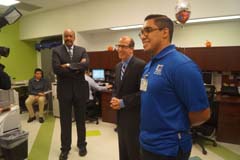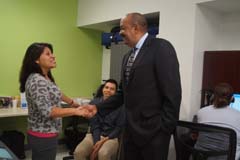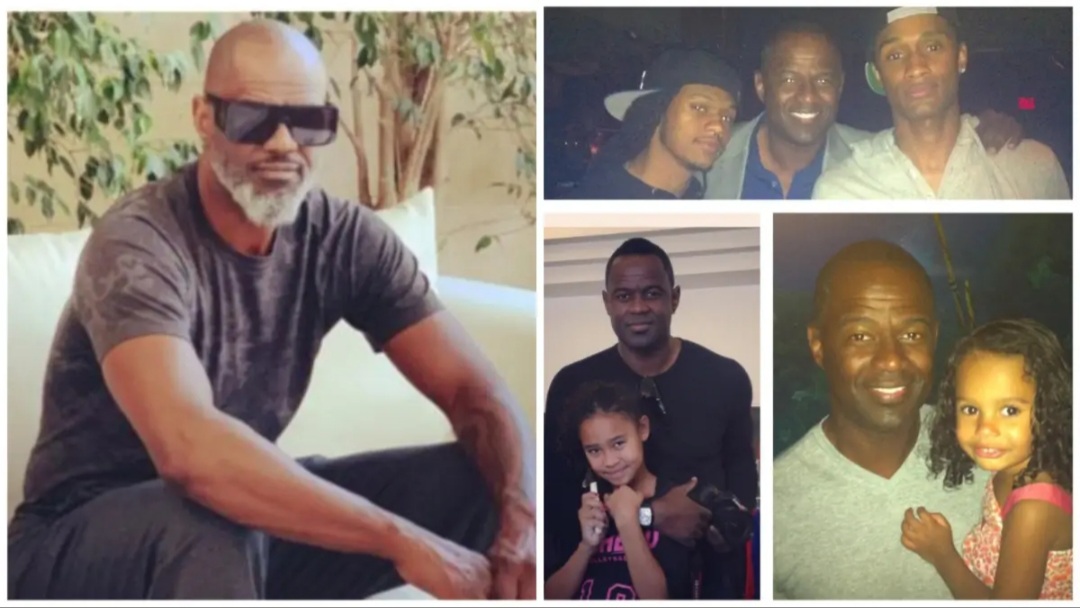
Looking to boost Black participation in Obamacare, advocates hope for better results in the second round of Covered California enrollment.
By McKenzie Jackson, www.cablackmedia.org
| Dr. Robert Ross President and CEO of the California Endowment stands with CEO of the Eisner Pediatric & Family Medical Center Herb Schultz and staff speaking with members of the press. |
With a new Affordable Healthcare Act (Obamacare) enrollment period now underway, healthcare advocates across the state are putting a renewed focus on boosting the number of African-Americans who sign up for Medi-Cal through Covered California.
One day before the new enrollment period opened on Nov. 15, California Endowment President/CEO Dr. Robert Ross spoke candidly about the topic while touring the Eisner Family & Pediatric Medical Center in downtown Los Angeles. The center is located in South Los Angeles and provides services for underserved communities.
“Quite frankly, for the African-American community in particular, we should not rest until we have 100 percent of African-Americans enrolled, because most of them don’t have the immigration or documentation problems – they are citizens,” said Ross, who also sits on the Covered California board. “And they should be eligible for a program. So we have to find them and get them in.”
The initial Covered California enrollment period, which concluded in March, delivered results that disappointed Black community advocates, who had hoped to see larger numbers of African-Americans enrolled. At seven percent of the state’s population, with an uninsured rate estimated at 17 percent, Blacks comprised only about three percent of the 3.4 million Covered California enrollees, with Latinos, Asians and Whites enrolled in much greater numbers. Noting the dramatic disparities, Black lawmakers and others decried what they saw as Covered California’s lack of effective, consistent outreach in the African-American community.
Ross believes that a lack of trust in the American healthcare system is one of the reasons Blacks may be hesitant to sign up for government-backed coverage. “The American medical healthcare system has not been particularly kind to the African-American community,” he said. “So, if you go back to the Tuskegee syphilis experiments in African-American men by the federal government … even though that was [decades] ago, it still is a sore spot with the African-American community.” He added that Black men, particularly younger ones, often have a sense of invulnerability – which leads them to believe they can overcome illness and injury on their own. “Trying to get folks out of that mindset,” Ross said, “is going to take a bit of time.”
Californians needing health coverage have until Feb. 15, 2015 to sign-up for Covered California providers such as Anthem Blue Cross, Health Net, Molina Healthcare and others. Consumers must enroll by Dec. 15 in order to guarantee coverage on Jan. 1. An expanded Medi-Cal program, which can also be accessed through Covered California, has the potential to serve millions more citizens.
Covered California and its partners say that in order to reach more African-Americans, a new emphasis will be placed on advertising in ethnic media and supporting targeted enrollment activities. Ross said they need to do better job of getting to trusted messengers in communities.
“The pastors, the ministers, the barber, the beauty salon owner,” he said. “I think this year you will see us continuing to moving more resources into African-American press and media outlets and get the word out.”
DOING WORK ON THE GROUND
 |
| Dr. Robert Ross President and CEO of the California Endowment meeting with Eisner Pediatric staff and touring the facility and call center stations. |
Although its patient base is largely Latino, the Eisner Center is working to help enroll Blacks in obtaining coverage and administering services. In the past 10 months, ten percent of the center’s patients have been African-American. Officials there say they have seen 14 Black Medi-Cal patients and two African-Americans with private insurance obtained through Covered California.
Herb K. Schultz, president and CEO of the Eisner Center, said the center is enrolling people every day – in either free or low-cost coverage through Medi-Cal, or My Health LA, a no-cost health program for Los Angeles County residents.
“There are thousands of them who have come into our doors, who we met in the community to enroll and have now become patients,” said Schultz. “So there are thousands of people who, if not for Obamacare, would be walking in our doors without an ability to pay, which they are entitled to and deserve to do. That’s the importance of Obamacare.”
Ross said, that there still might be some kinks in the enrollment process, but the process will be better. “For example, the Covered California hotline was really tough for consumers the first year,” he said. “Many people had one-hour, two-hour, three-hour waiting times to talk to someone. This year it will be a lot better.”




